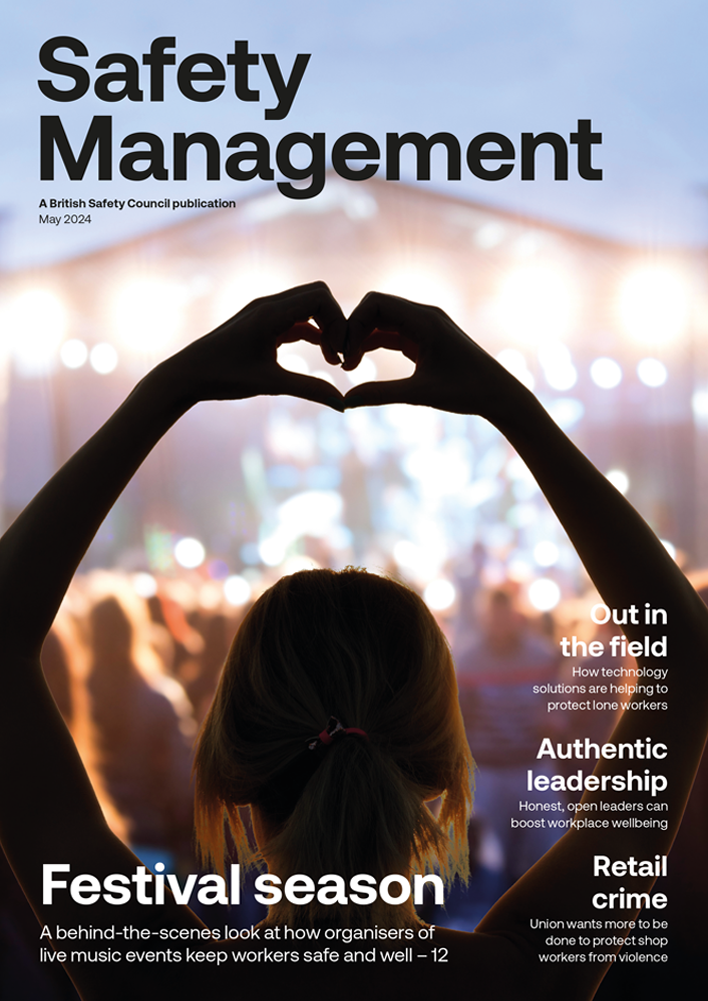Experts were invited to share insights into employee and organisational wellbeing at British Safety Council’s third annual Wellbeing Conference on 18 April.
News
Wellbeing Conference 2023: highlights from an amazing day
Delivering the opening keynote, Jonathan Gawthrop, executive director of wellbeing sustainability & assurance at EMCOR UK, considered how we define wellbeing. It encompasses our ‘physical, mental and social state’, but this definition has only ‘come to life’ in the past six years.
Turning theory into practice is more complicated he suggested – the organisation’s purpose is key to a healthy culture. ‘If your people [and customers] can’t ‘taste and feel’ your purpose, then it "isn’t authentic,” he said.
 Marcus Herbert: "Understanding staff better is [key to making wellbeing work in your organisation]"
Marcus Herbert: "Understanding staff better is [key to making wellbeing work in your organisation]"
With experience in auditing in high hazard industries including the petrochemical sector, Dr Audrey Fleming, British Safety Council’s wellbeing health & safety auditor advocated going on site and winning people’s trust to get a true account of their wellbeing at work. “Questionnaires give you the what, but not the why,” she stated.
Colleague, Marcus Herbert, head of wellbeing at the British Safety Council, shared findings from holding workshops for SMEs for the Keep Thriving wellbeing campaign. He said many organisations which applied to the sessions shared the same problems, including low employee engagement (28 per cent), not enough time to spend on wellbeing (29 per cent) and changes in the business (19 per cent). However, only 3 per cent said that understanding staff better would help to improve wellbeing and yet he said this is crucial for success.
Is hybrid working Heaven or Hell? This was the question put by Bex Moorhouse, director of corporate wellness consultancy Invigorate Spaces Ltd. Compelling reasons for hybrid include more work / life balance, fewer cases of depression and the opportunity to take ‘micro breaks’. Full time office workers are more likely to experience burnout, in part due to long commutes, but also presenteeism.
 Bex Moorhouse: "Too many companies look over [their shoulder] at what others are doing."
Bex Moorhouse: "Too many companies look over [their shoulder] at what others are doing."
The downsides of hybrid working include isolation and reduced feelings of company loyalty. To make hybrid working work, she urged employers ‘define the type of hybrid you will operate based on organisational values’. “Too many companies look over [their shoulder] at what others are doing, work out what is best for you,” she advised.
It’s not always about winning, but it is for Chris Armstrong, who heads up wellbeing at Mercedes-AMG Petronas’s Formula One team. At F1, sustaining championship-winning capabilities of its people is key, so they put emphasis on interventions like physical health assessments, nutrition for performance and strategies for recovery. His tip was to "really think what’s important [in your company]. Start small, and build [from there].”
Dr Julie Riggs, senior head of education at the British Safety Council, spoke of the impact of indoor air quality on the brain and wellbeing. She urged for more research into the issue and for more public discourse and engagement.
Finally, Sarah Meek, managing director of Mates in Mind closed the day with a talk on the ‘maturity pathway’ towards improved mental health. Crucially, this was about preventative action rather than tertiary, or reactive measures. A poll during the talk showed that a third of attendees did not proactively mitigate exposures to work-related stress, which showed room for improvement. “Culture and policies need to [align] or employees will be confused,” she added.
The online event was chaired by Stephen Haynes, British Safety Council’s director of wellbeing. “What an amazing day,” he said in closing the sessions. Authenticity was the word that stood out he said: “How we make [our approaches] land and how do we make them genuine [is key].”
NEWS

‘Obesity crisis’ is making people too sick to work, warns IPPR
By Kerry Reals on 10 May 2024
Obesity is contributing to rising economic inactivity levels in the UK and is making workers less productive, says the Institute for Public Policy Research (IPPR), which is calling for government intervention to crack down on ultra-processed foods and create an “obesity-free generation”.

UK population becoming more anxious and less satisfied, ONS wellbeing report shows
By Kerry Reals on 09 May 2024
One in 17 people in the UK have low life satisfaction and almost a quarter have high levels of anxiety, a new report focused on wellbeing by the Office for National Statistics (ONS) has revealed.

Future mental health support at work will be tailored to individuals and based on data
By Kerry Reals on 02 May 2024
Mental health support in workplaces of the future is likely to be much more tailored to individual employees’ needs, based on data collected about each person, and will recognise the increasingly blurred boundary between work and home life.



